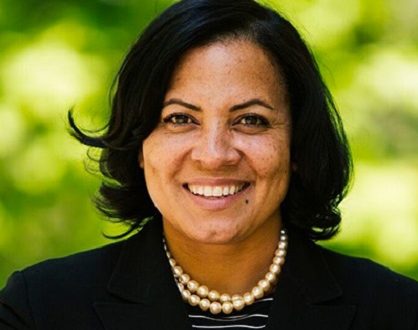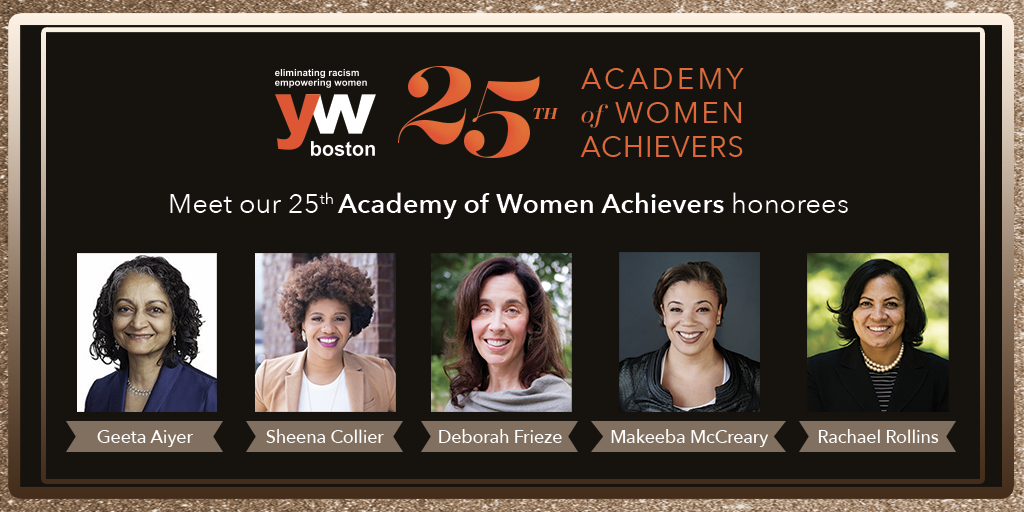Meet Rachael Rollins, 2020 Academy of Women Achievers Awardee

On October 29, 2020 we will join together and celebrate the achievements of five unstoppable women who demonstrate YW Boston’s mission of eliminating racism and empowering women at our 25th Anniversary Academy of Women Achievers Luncheon. Please note that due to COVID-19 concerns, this event has been postponed from June 2 to October 29.
Since 1995, as part of our mission to promote and celebrate the achievements of women, YW Boston has held the Academy of Women Achievers luncheon. Through this event, we recognize and honor some of Boston’s brightest, boldest, bravest, and most influential women. Leading up to the event, we are sitting down with each of the 2020 awardees for interviews and releasing one each month.
YW Boston cannot wait to induct Rachael Rollins into the Academy of Women Achievers. She assumed the position of Suffolk County District Attorney in January 2019, becoming the first woman to be elected to that position in Suffolk County history, and the first woman of color ever to serve as a Massachusetts district attorney. In her position, she is dedicated to meaningful, substantive reform to the criminal justice system. To learn about Rachael, read our interview with her:
_
We are thrilled to honor you at our 25th Academy of Women Achievers on October 29th. Can you please tell us about your history with YW Boston and what about our work resonates with you?
Everything that YW Boston stands for – eliminating racism, empowering women, and promoting peace, justice, freedom, and dignity for all – I stand for as well. We must speak loudly against injustice and oppression when we see it. Then we must use every resource at our disposal to dismantle those systems and rebuild with an eye toward equality for all not just the privileged few.
In your speech accepting the post of District Attorney in 2018, you stated your wish to make justice more equitable. How would you describe your philosophy in your current position?
Prosecutors have a responsibility to serve the community – that includes victims, defendants, and their families and neighbors. If we embrace that perspective; if we understand the collateral consequences of our decisions and how they reverberate throughout the community, then we can start exploring the best way to ensure public safety. Sometimes that may necessitate incarceration, but certainly not always. Accountability does not always require incarceration. Wealth should not dictate liberty. Treatment should not be subordinate to punishment. I want to explore meaningful reform around mental health, substance use, food and housing insecurity, and poverty. It is not just the smart thing to do; it is the right thing to do.
In my administration, justice does not begin at arrest or arraignment. It begins with community. Serving the community means engaging with the community, not just on the worst days of their lives, but every day; not just in courtrooms, but in their neighborhoods. We are committed to serving and engaging with the community we took an oath to protect. I visit Department of Youth Services, House of Corrections, and Department of Corrections facilities on a regular basis, so I understand the gravity of our work. We hired a licensed clinical social worker as Chief of our Victim Witness Advocates, so we can implement trauma-informed care for survivors. We created an Innovation and Strategy department because data should inform practice. We are helping usher in prosecution for a new era, one that understands the complexities, biases, and barriers in our systems, and one in which we are on the frontlines of reform.
'Serving the community means engaging with the community, not just on the worst days of their lives, but every day; not just in courtrooms, but in their neighborhoods.' -Rachael Rollins, Suffolk County DA and #AWA2020 awardee Share on XCan you please tell us about a moment that helped you decide to run for District Attorney?
I am trying to change a system that was created by and for people who do not look like me, but with people like me directly in mind. I have siblings who have cycled in and out of the criminal justice system and who have struggled with substance use disorders. I am the guardian of my nieces because of those realities. Criminal injustice is not something I read about in Michelle Alexander’s “The New Jim Crow.” I have lived it. I still do. Reform is not just my life’s work. It is my life.
I decided to run for office because I was tired. It seemed like every time I turned on my television, there was an officer-involved shooting: Michael Brown, Tyisha Miller, Tamir Rice, Rekia Boyd, Eric Garner, Laquan McDonald, Freddie Gray, Alton Sterling, Philando Castile. I could see the unrest and tension in black and brown communities. I could feel the mistrust and fear. I wanted to change that, so I ran for District Attorney.
Your election marked the first time a woman of color has held the District Attorney position in Massachusetts, and the first time a woman has held the Suffolk County DA position. Do you believe your identities inform your work, and if so, how?
Who I am will always inform what I do and how I do it. I do not let labels define me, but I do let my identity guide me. I also understand how my identity informs others’ perspectives and biases. I have been called pushy, bossy, aggressive and a few other words I prefer not to put in writing. A lot of that language is gendered; some of it is racial; and there are days I think it is more trouble than it is worth. It is 2020! This should not be so hard! But it is.
Here is how I cope. I say, call me pushy – I push for policies that I know will make a difference in the lives of the community I was elected and took an oath to serve. Call me bossy – after all, I am the boss. As the DA, I have assembled a team that is rebuilding a more just system fueled by equity, dignity, and integrity. Call me aggressive – I never back down from a challenge. It is why Massachusetts is leading the fight for immigrants’ rights and eliminating wealth-based and race-based disparities in the criminal justice system. I am committed to this mission, and name-calling will not deter me from achieving it.
'Call me bossy – after all, I am the boss. As the DA, I have assembled a team that is rebuilding a more just system fueled by equity, dignity, and integrity.' -Rachael Rollins, Suffolk County District Attorney and #AWA2020 awardee Share on XBecause of your focus on equity, a number of officials with more traditional views have criticized your positions and policies. How do you find the courage and strength to stand up for your beliefs?
I did not realize how much of my job would be educating, combating misinformation, and debunking myths. There is no doubt that we are advocating for fundamental change in the criminal justice system. Change makes people uncomfortable. When people are uncomfortable – out of fear or out of a need to retain power – they grasp onto myths that reinforce the status quo.
One of the biggest myths about progressive prosecutors is that we prioritize reform over public safety. Critiques want to create a zero-sum game, creating false binaries which pit efficiency against fairness, safety against justice, supposed heroes against alleged villains. That is a simplistic and dishonest understanding of how systems work and interact with one another. This is not a battle between safety and justice; it is a battle between two competing visions of public safety. My policies may make people uncomfortable, but change never happens when we are comfortable.
The ACLU has praised you for your response to the current COVID-19 crisis, which includes your release of low-risk people in prison. What does it mean to you to be responsive, as an elected official, to moments of crisis?
Bold, decisive leadership is necessary in crisis. During these unprecedented times, we are staying true to our responsibility of providing a fair, proportional, and equitable administration of justice in Suffolk County. COVID-19 is not the great equalizer, but the great exacerbator. We must focus on the most vulnerable groups – the poor and communities of color; the elderly and veterans – because the virus has hit them the hardest. Many “essential” workers do not have the luxury of working from home. Many do not even make a living wage, and therefore must work in spite of the health risks. Some lack access to private healthcare or live in communal housing that increases the risk of exposure. They are experiencing the life and death consequences of inequities that have existed long before the virus.
As I do with criminal justice, I take a public health approach to COVID-19. There is no us v. them, no victim v. defendant. I was proud to join the Committee for Public Counsel Services and the Massachusetts Association of Criminal Defense Lawyers in the brief they filed in our state’s Supreme Judicial Court to release certain low-risk inmates in the interest of public health. My response to this crisis stems from a commitment to my profound belief that we must always do what is right and that people do not stop being human the day they are sentenced.
The YW Boston audience is committed to our mission of eliminating racism and empowering women, a mission tied heavily to issues of criminal justice. What would you say to individuals of our audience looking to help create a more equitable system?
Our nation’s racial history is ugly and runs deep. It is not just our original sin; it is our mutating virus. We went from slavery to Jim Crow to mass incarceration. Black and brown Americans helped build this country. Our blood is in its soil. But, if we truly want to heal, we need to confront the underlying wound. Funding programs and passing policies while failing to talk about racial injustice is like putting a Band-Aid on a gaping wound – it will not stop the bleeding.
We need to talk about race and how it influences our systems and policies. We need to confront our past in order to build a more just and equitable future. Late last year I had the honor of walking across the Edmund Pettus Bridge in Selma, arm and arm with fellow progressive prosecutors. It was humbling to walk the same path so many brave men and women walked decades ago. They dared to dream of more. They refused to settle for less. Change was urgent then. Change continues to be urgent now. The fight for civil rights is not just our past; it remains our future. We must run, not walk to ensure that legacy. That is our present. So, you must vote. You must respond to the Census. You must demand data so we can track disparities and create change. You must be engaged. Ignorance is no longer bliss; it is compliance. Let’s do better.
'The fight for civil rights is not just our past; it remains our future. We must run, not walk to ensure that legacy. That is our present.' -Rachael Rollins, Suffolk County District Attorney and #AWA2020 awardee Share on X_
Learn more from Rachael Rollins at our 25th Annual Academy of Women Achievers Luncheon on Thursday, October 29, 2020.

